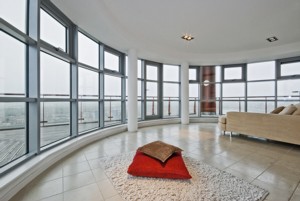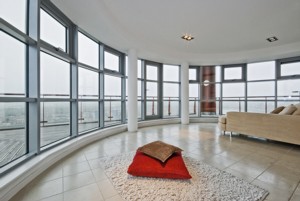Letting in the light means more windows; do it once and do it right.

Buildings that are designed to let in light usually have big areas of glass. Double glazing this area is essential and means insulating the project beyond the minimal five-star criteria, which only ensures basic insulation.
An average 85 per cent of heat loss in winter and 45 per cent of heat gain in summer is through windows and doors. Letting in the light means the glazed area increases, which means the losses can be even bigger. This simple fact shows that proper insulation of windows and doors is crucial.
A sensible design has a higher ratio of fixed panels and strategically placed openings that allow for cross ventilation and night purge.
Besides the glazing, it is important to look at framing, hardware and seals. If the frame conducts heat, you might have unwanted gain or loss of heat. If you have none or the wrong seal, you will have a constant air leak, causing unwanted drafts and noise travelling through the gaps.
If the hardware does not contribute to the tight closure, you might not be able to seal your windows so they are airtight and secure. Especially over time, it is crucial to have quality hardware and seals. Very often, the differences are not visible in the first year.
Windows and doors are long-term investments in living comfort and the natural way to light up your living space. By choosing your supplier carefully in the planning stage, you will be able to save in the long run.
“Double glazing is where our range starts, because it’s our belief this should be standard in every Australian home,” said Kris Sandvoss from Miglas Windows. “Beyond that, we offer superior hardware and seals that mean further improvement of the performance.”
Miglas — High Performance Windows
03 9728 3999
info@miglas.com.au
www.miglas.com.au
Double glazing:
Double glazing is also known as Insulating Glass Unit (IGU), with a recommended air gap of 10-16mm. If the gap is smaller or bigger, the unit is not performing at its peak. Special coatings such as Low E can further improve the glazing.
Seals:
Look for durable and lasting TPE (thermo-plastic elastomer) seals that offer a good memory function and a tight seal over time for low air leakage. Brushed seals or other rubbers are a cheap compromise.
Framing:
Low-conductive materials such as timber or uPVC are preferable in regard to thermal insulation. Miglas combines the thermal properties of timber and the durability of aluminium in one product.
Photography by Matthew Mallet






